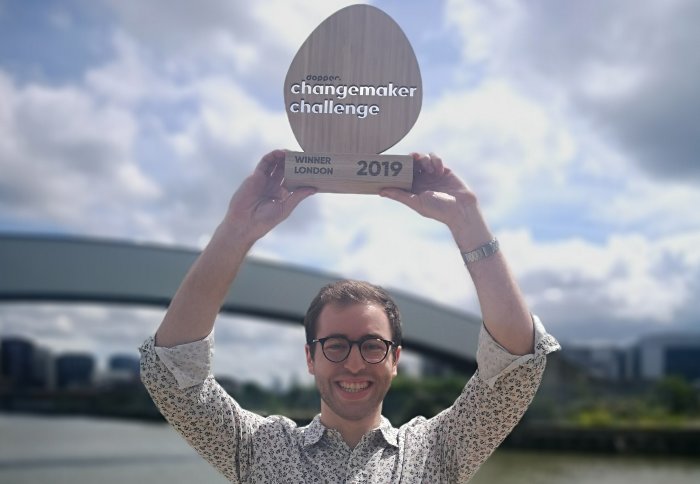Student wins Changemaker Challenge for low-carbon material made with kelp

A student has won first prize in the Dopper Changemaker Challenge for his project "Novel Low-Carbon Materials Made From Sustainable Kelp Composites".
Currently in the fourth year of his undergraduate degree in Civil Engineering, Marcus Rodin is supervised by Professor Chris Cheeseman.
Marcus’s project focuses on using kelp to create a low-cost, sustainable, and biodegradable material.
“The motivation for using kelp has much to do with climate change, because kelp is a massive carbon sink,” said Marcus. “Sometimes it’s not possible for industries to fully remove their greenhouse gas emissions, but kelp farming can help remove carbon from the atmosphere.
“The idea is that the kelp forests growing in oceans across the world absorb carbon from the atmosphere through photosynthesis. They are extremely easy to grow, and after about one year they’ve absorbed the maximum amount of carbon that they can, and that’s when we harvest them.
“This material biodegrades naturally, so if it’s put back into the ocean the carbon is absorbed by more kelp, forming a circular cycle.”
In February Marcus travelled to the south coast of England and gathered 5kg of kelp for his project.

The kelp was air dried in the Department’s new Centre for Infrastructure Materials Laboratory, then crushed into a powder using a TEMA mill.
The dried kelp powder was mixed with varying contents of sand and water, and dried in moulds for 48 hours.
“There’s a lot of pores in the microstructure, which means it’s not a competitive material at the moment,” said Marcus. “So we need to add alternative fillers, such as clay or starch, to make the structure denser.
“I see this material heading towards single-use applications, such as a replacement for polystyrene in packing, or as insulation for casting applications due to its mouldable properties.
“In the week leading up to the Dopper Changemaker Challenge I counted that I disposed of 46 single-use plastics,” added Marcus. “Imagine how many of these could be replaced by kelp composite materials?”
From his success in the Dopper Challenge, Marcus has won the opportunity to pitch his idea on a greater scale, along with £5,000 prize money. He is looking forward to continuing his investigation into kelp composite materials.
Article text (excluding photos or graphics) © Imperial College London.
Photos and graphics subject to third party copyright used with permission or © Imperial College London.
Reporter
Melanie Hargreaves
Department of Civil and Environmental Engineering